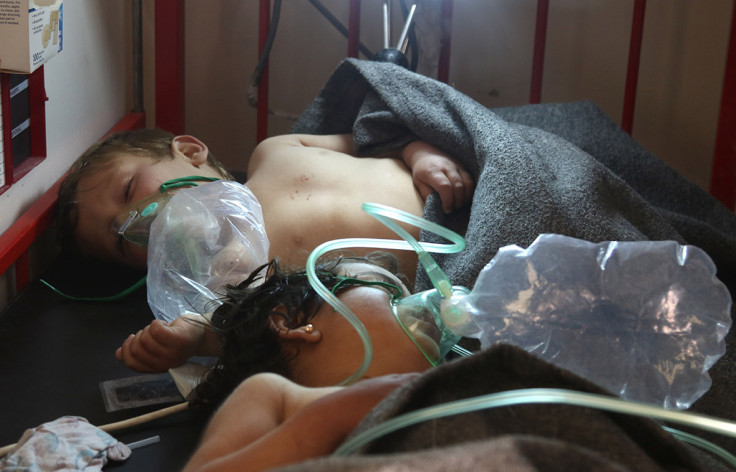Trump blames suspected Syria gas attack on Obama administration's 'weakness and irresolution'
As the White House struggles to explain its Syria policy, France calls for clarity on the US position.
In the aftermath of one of the worst suspected chemical bombings in Syria's six-year war that killed dozens of people, including children, Donald Trump's administration called the attack "reprehensible" and said it "cannot be ignored by the civilised world" before pointing a finger at Barack Obama.
In a statement on Tuesday (4 April), the US president said: "These heinous actions by the Bashar al-Assad regime are a consequence of the last administration's weakness and irresolution.
"President Obama said in 2012 that he would establish a 'red line' against the use of chemical weapons and then did nothing." he added. Obama aides refused to comment on the president's blame game, the Associated Press (AP) reported.
Trump faulted his predecessor for doing "nothing" but has previously argued against US military action in the war-torn nation.
Following the Ghouta attack in 2013, Trump tweeted: "President Obama, do not attack Syria. There is no upside and tremendous downside. Save your 'powder' for another (and more important) day!"
AGAIN, TO OUR VERY FOOLISH LEADER, DO NOT ATTACK SYRIA - IF YOU DO MANY VERY BAD THINGS WILL HAPPEN & FROM THAT FIGHT THE U.S. GETS NOTHING!
— Donald J. Trump (@realDonaldTrump) September 5, 2013
While Trump was quick to assign blame, he offered no answers as to how his administration would deal with Syria differently compared to the previous one. Nor did he offer any insight as to what impact the latest attack would have on Iran and Russia, the key supporters of Syrian President Bashar al-Assad.
While the international community moved swiftly to condemn the suspected gas attack on Khan Sheikhoun in Idlib province, US Secretary of State Rex Tillerson ignored a press question on the matter during a visit to Jordan, the Guardian reported.
He later issued a statement saying: "While we continue to monitor the terrible situation, it is clear that this is how Bashar al-Assad operates: with brutal, unabashed barbarism."
He added: "We call upon Russia and Iran, yet again, to exercise their influence over the Syrian regime and to guarantee that this sort of horrific attack never happens again."
The former oil executive has been criticised for his recent comments in Turkey when he told reporters that the "longer-term status of President Assad will be decided by the Syrian people."
Tillerson's remark signalled a shift in US policy towards Assad and the country's UN ambassador, Nikki Haley, went even further last week saying: "Our priority is no longer to sit there and focus on getting Assad out.
"Do we think he's a hindrance? Yes. Are we going to sit there and focus on getting him out? No," she added.

Tillerson's recent remarks on US policy in Syria was blasted by Republican Senator John McCain, who said he cannot see a clear foreign policy doctrine from the Trump administration.
"I'm sure they [Assad and Russia] took note of what our Secretary of State said just the other day that the Syrian people would be determining their own future themselves – one of the more incredible statements I've ever heard," McCain added.
"I'm sure they are encouraged to know the United States is withdrawing and seeking a new arrangement with the Russians," he added. "It is another disgraceful chapter in American history and it was predictable."
Paris has called on Washington to clarify its position regarding Syria following the attack.
Speaking on Tuesday, French Foreign Minister Jean-Marc Ayrault said: "I told them that we need clarity. What's your position? The question is to know, yes or no, whether the Americans support a political transition in Syria, which means organising this transition, elections, and that at the end of the process, the question of Assad's departure is asked."
© Copyright IBTimes 2024. All rights reserved.






